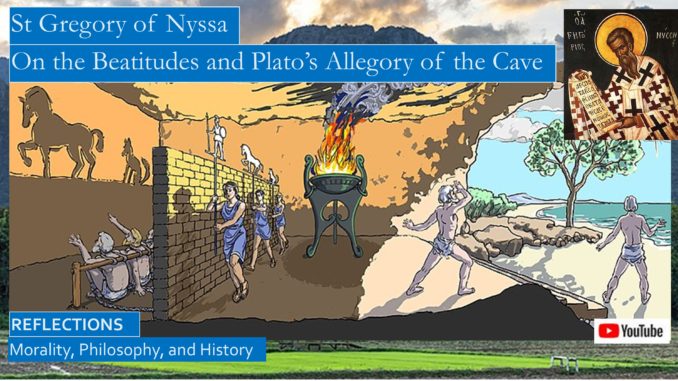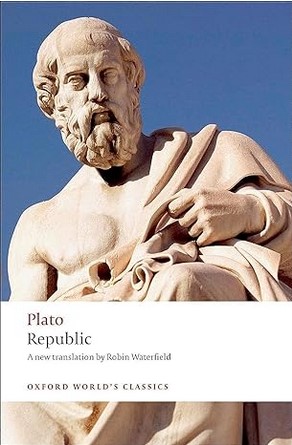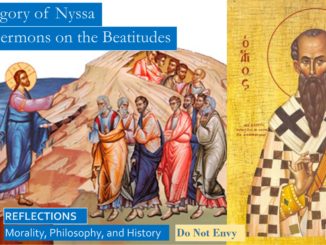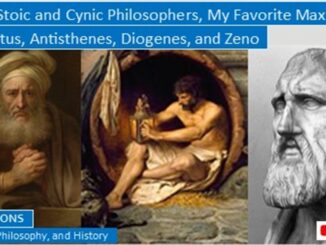
The Beatitudes and St Nyssa’s sermons on the Beatitudes are both poetry of the soul. St Nyssa asks us, “Who among us is a disciple of the Word, seeking to ascend with our Lord from the low ground, from superficial and ignoble thoughts to the spiritual mountain of sublime concentration? This mountain leaves behind all shadows cast by the rising hills of wickedness, this mountain is lit up on all sides by the rays of true light, from the summit of this mountain everything that is invisible to those imprisoned in the CAVE may be seen the pure air of truth.”[1]
The editor footnotes this passage, because many modern readers are not familiar with Plato’s allegory of the cave. But the climb up from this cave lies at the center of Platonic moral philosophy, and ancient readers would remember this parable just as all Christians remember the Parable of the Good Samaritan.
YouTube video: https://youtu.be/wuqwy3GyO_4
YouTube script with more book links:
https://www.slideshare.net/BruceStrom1/st-gregory-of-nyssa-on-beatitudes-platos-allegory-of-the-cave-and-cs-lewis-and-great-divorce
A similar allegory is the Flying Bus that flies to Heaven from Hell in CS Lewis’ Great Divorce:
http://www.seekingvirtueandwisdom.com/cs-lewis-great-divorce-an-allegory-of-hell-and-platos-cave/
The allegory of the cave is a platonic parable showing how we, mere mortal men, imagine that our mortal ignorance can truly comprehend the immortal wisdom of the stars above. We cannot improve on Plato’s description of the allegory: “Behold! Mere mortals living in an underground den, with a mouth open to the light and reaching all along the den, these men have had their legs and necks chained since childhood, they can only see before them, they cannot turn their heads. Above and behind them a fire is blazing at a distance, behind them is a low wall like the screen which marionette players have in front of them, over which they show the puppets. Men are walking on top of the wall carrying all sorts of vessels, and statues and figures of animals made of wood and stone and various materials, some of the men are talking, some are silent. In front the chained men only see the shadows of the men walking on the opposite wall of the cave.”
The men in the cave, the men staring at the shadows on the wall of the cave, those shadows on the wall of the cave are all the men know, they imagine that is all there is to know, they do not know what is up beyond the cave.
What does Plato tell us when “any one of the prisoners is liberated and compelled suddenly to stand up and turn his neck round and walk and look towards the light? He will suffer sharp pains; the glare will distress him.” Then he will realize “that what he saw before was an illusion,” as he climbs out of the cave into the light, and he will see the sun and the moon and the stars and the true reality rather than the reflections of the shadows on the cave, where the true riches are not the silver and gold of the cave, but “virtue and wisdom, the true blessings of life.”
What does Plato tell us of the man who spent time in the light and then descended back into the cave? His fellow men in chains would no longer understand what he had to say to them, they would say that “he went up and came back down without his eyes, and that no other man should even think of ascending, and if anyone tried to loose another and lead him up to the light, let them only catch the offender, and they would put him to death.”
Plato explains the allegory, the cave, or “the prison-house is the world of sight, the light of the fire is the sun, and the journey upwards is the ascent of the soul into the intellectual world. . . In the world of knowledge the idea of good appears last of all, and IS SEEN ONLY WTH AN EFFORT, and when seen is inferred to be the universal author of all things beautiful and right, parent of light and of the lord of light in this visible world, and the immediate source of reason and truth in the intellect.”[2]
The ancient Greeks speak of philosophers in the same way we speak of preachers today, both the ancient philosopher and today’s preacher exhort us to live a virtuous and godly life. The main difference is the Greek philosophers had a stronger sense that men should not behave like ignorant beasts, prisoners to their passions, but should rather seek to ascend out of the cave into the light into the world of the good and reason and truth. The climb out of the cave does take effort, it takes the discipline of living a godly life every day, you must expend effort in gaining wisdom through study and contemplation of that which is good, of Scriptures and philosophy and the teachings of the Church Fathers.
What does St Gregory of Nyssa say of those who climbed up out of the cave into the light, then ascends the mountain of God, that terrible quaking mountain of smoke and thunder and lightning that Moses ascended for the gift of the Decalogue, that mountain that we can now ascend as adopted sons of God to hear the Words of Jesus? “The Word of God Himself calls blessed those who have ascended the mountain with Him.” “Jesus points out with His finger here the Kingdom of Heaven, there the inheritance of the earth that is above, then mercy, justice, consolation, kinship with the God of all creation, and the fruit of persecution, that is, to become a friend of God.”[3]
We climb out of the cave of passions into the light where we seek virtue and wisdom, but that was just preparation for climbing the mountain, which was the metaphor CS Lewis used for salvation. When those who crossed the chasm were driven to the broad meadow, then they climbed the mountain leading to the light of the world for all eternity.
St Augustine in his Confessions tells us how his conversion to Platonism led to his conversion to Christianity. St Augustine was one of the few saints that had dual beatific visions, he had a Platonic vision where he saw the light as he climbed out of the cave of Manicheism, and he had a dual beatific vision with his mother Monica at the window of their garden, where they both experienced the uncreated light of God. Many Christians who belief that faith is purely emotional and that Christians are not permitted by their faith to question matters of faith, to seek a deeper understanding of their faith, that Christians do not need to MAKE AN EFFORT to seek virtue and wisdom, do so under the mistaken belief that working towards salvation is somehow a bad thing, because you cannot be saved by your works. But our minds are what separate us from the beasts, if we lose our minds we would lose our souls.
We should test the ancient philosophers, and discard that which is not in accord with the Word of God, but you reject the best of the ancient philosophers at your peril, for the best of the ancient philosophers seek to learn to live a life of selfless devotion to virtue and wisdom. If you somehow think it is good to reject those who seek virtue and wisdom, you may not be a true Christian.
The ancient philosophers prepare us for the climb up the mountain, for Christianity, born from Judaism, was born from the Law of God and the Gospel, the Word of God, which teaches not only that we should love our neighbor as ourselves, but has a rich collection of stories of the patriarchs and the kings, and the Torah, which not only exhorts us to love our neighbor as ourselves, but also gifts to us a detailed blueprint on how to live a godly life. Ancient philosophy has the broad brush approach but lacks the detailed brush strokes of a rich and ancient legal and moral tradition to live a godly life daily.
St Gregory of Nyssa, Beatitudes, Blog 2, Blessed are the Poor in Spirit: http://www.seekingvirtueandwisdom.com/st-gregory-of-nyssa-beatitudes-blog-2-blessed-are-the-poor-in-spirit/
[1] St Gregory of Nyssa, “On Beatitudes,” in The Lord’s Prayer, the Beatitudes, translated by Hilda C Graff, (New York: Paulist Press, 1954) p. 85.
[2] Plato, “The Republic,” Book VII, in The Republic and Other Works, translated by Benjamin Jowett, (New York, Doubleday Books, 1960) pp. 205-211.
[3] St Gregory of Nyssa, “On Beatitudes,” p. 85.







3 Trackbacks / Pingbacks